Frequent persons on Czech-republic's street signs
countries
143 names / 4550 streets
Jan Hus
 208
Jan Hus, sometimes anglicized as John Hus or John Huss, and referred to in historical texts as Iohannes Hus or Johannes Huss, was a Czech theologian and philosopher who became a Church reformer and...
208
Jan Hus, sometimes anglicized as John Hus or John Huss, and referred to in historical texts as Iohannes Hus or Johannes Huss, was a Czech theologian and philosopher who became a Church reformer and...
John Amos Comenius
 203
John Amos Comenius was a Moravian philosopher, pedagogue and theologian who is considered the father of modern education. He served as the last bishop of the Unity of the Brethren before becoming a...
203
John Amos Comenius was a Moravian philosopher, pedagogue and theologian who is considered the father of modern education. He served as the last bishop of the Unity of the Brethren before becoming a...
Tomáš Masaryk
 172
Tomáš Garrigue Masaryk was a Czechoslovak statesman, progressive political activist and philosopher who served as the first president of Czechoslovakia from 1918 to 1935. He is regarded as the...
172
Tomáš Garrigue Masaryk was a Czechoslovak statesman, progressive political activist and philosopher who served as the first president of Czechoslovakia from 1918 to 1935. He is regarded as the...
Miroslav Tyrš
 161
Miroslav Tyrš was a Czech philosopher, art historian, sports organizer and together with Jindřich Fügner the cofounder of the Sokol movement.
161
Miroslav Tyrš was a Czech philosopher, art historian, sports organizer and together with Jindřich Fügner the cofounder of the Sokol movement.
Jan Žižka
 150
Jan Žižka z Trocnova a Kalicha was a Czech general who was a contemporary and follower of Jan Hus and a Radical Hussite and led the Taborites. Žižka was a successful military leader and is now a...
150
Jan Žižka z Trocnova a Kalicha was a Czech general who was a contemporary and follower of Jan Hus and a Radical Hussite and led the Taborites. Žižka was a successful military leader and is now a...
Karel Havlíček Borovský
 143
Karel Havlíček Borovský was a Czech writer, poet, critic, politician, journalist, and publisher.
143
Karel Havlíček Borovský was a Czech writer, poet, critic, politician, journalist, and publisher.
Alois Jirásek
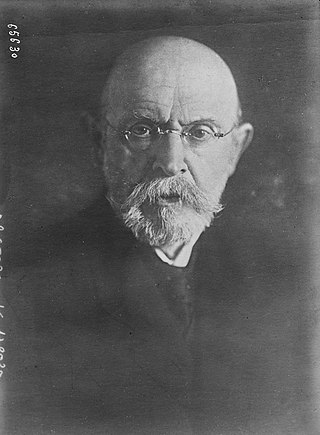 143
Alois Jirásek was a Czech writer, author of historical novels and plays. Jirásek was a high school history teacher in Litomyšl and later in Prague until his retirement in 1909. He wrote a series of...
143
Alois Jirásek was a Czech writer, author of historical novels and plays. Jirásek was a high school history teacher in Litomyšl and later in Prague until his retirement in 1909. He wrote a series of...
František Palacký
 139
František Palacký was a Czech historian and politician, the most influential person of the Czech National Revival, called "Father of the Nation".
139
František Palacký was a Czech historian and politician, the most influential person of the Czech National Revival, called "Father of the Nation".
Bedřich Smetana
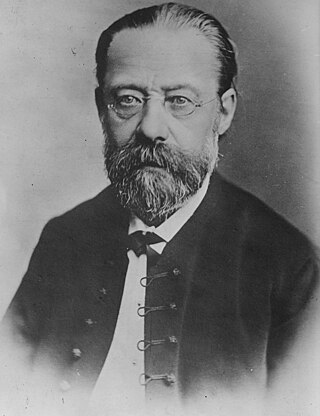 136
Bedřich Smetana was a Czech composer who pioneered the development of a musical style that became closely identified with his people's aspirations to a cultural and political "revival". He has been...
136
Bedřich Smetana was a Czech composer who pioneered the development of a musical style that became closely identified with his people's aspirations to a cultural and political "revival". He has been...
Jan Neruda
 117
Jan Nepomuk Neruda was a Czech journalist, writer, poet and art critic; one of the most prominent representatives of Czech Realism and a member of the "May School".
117
Jan Nepomuk Neruda was a Czech journalist, writer, poet and art critic; one of the most prominent representatives of Czech Realism and a member of the "May School".
Božena Němcová
 117
Božena Němcová was a Czech writer of the final phase of the Czech National Revival movement.
117
Božena Němcová was a Czech writer of the final phase of the Czech National Revival movement.
Petr Bezruč
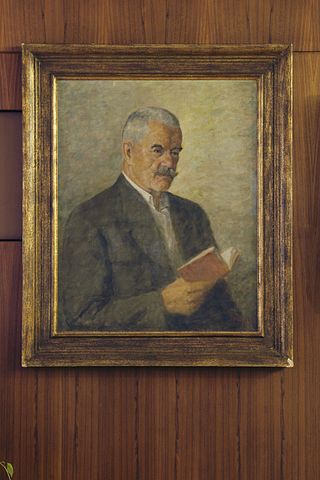 111
Petr Bezruč was the pseudonym of Vladimír Vašek, a Czech poet and short story writer who was associated with the region of Austrian Silesia.
111
Petr Bezruč was the pseudonym of Vladimír Vašek, a Czech poet and short story writer who was associated with the region of Austrian Silesia.
Svatopluk Čech
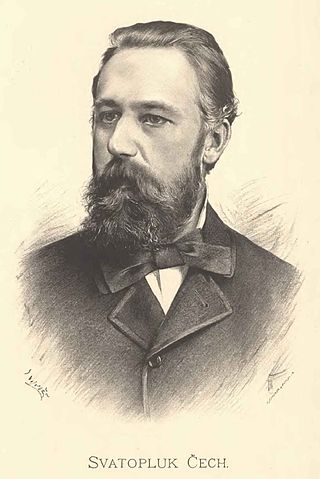 95
Svatopluk Čech was a Czech writer, journalist and poet.
95
Svatopluk Čech was a Czech writer, journalist and poet.
Antonín Dvořák
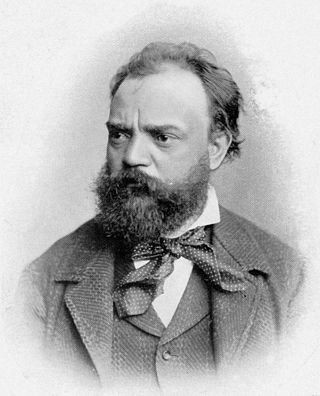 95
Antonín Leopold Dvořák was a Czech composer. Dvořák frequently employed rhythms and other aspects of the folk music of Moravia and his native Bohemia, following the Romantic-era nationalist example...
95
Antonín Leopold Dvořák was a Czech composer. Dvořák frequently employed rhythms and other aspects of the folk music of Moravia and his native Bohemia, following the Romantic-era nationalist example...
Karel Hynek Mácha
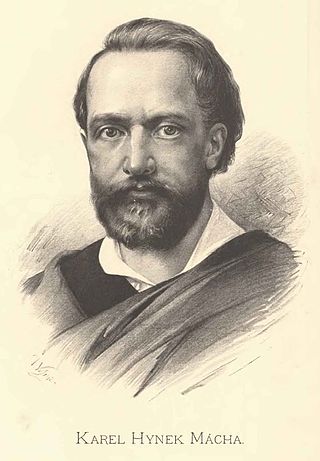 84
Karel Hynek Mácha was a Czech romantic poet.
84
Karel Hynek Mácha was a Czech romantic poet.
Josef Kajetán Tyl
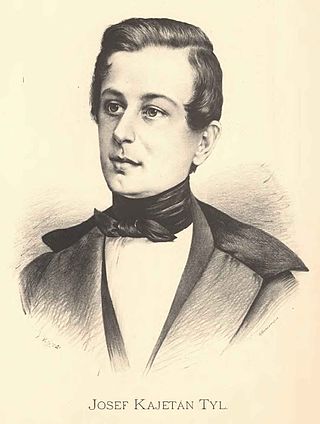 78
Josef Kajetán Tyl was a significant Czech dramatist, writer, and actor. He was a notable figure in the Czech National Revival movement and is best known as the author of the current national anthem...
78
Josef Kajetán Tyl was a significant Czech dramatist, writer, and actor. He was a notable figure in the Czech National Revival movement and is best known as the author of the current national anthem...
Jaroslav Vrchlický
 71
Jaroslav Vrchlický was a Czech lyrical poet. He was nominated for the Nobel prize in literature eight times.
71
Jaroslav Vrchlický was a Czech lyrical poet. He was nominated for the Nobel prize in literature eight times.
Josef Mánes
 66
Josef Mánes was a Czech painter.
66
Josef Mánes was a Czech painter.
Ludvík Svoboda
 65
Ludvík Svoboda was a Czech general and politician. He fought in both World Wars, for which he was regarded as a national hero, and he later served as the president of Czechoslovakia from 1968 to 1975.
65
Ludvík Svoboda was a Czech general and politician. He fought in both World Wars, for which he was regarded as a national hero, and he later served as the president of Czechoslovakia from 1968 to 1975.
George of Poděbrady
 64
George of Kunštát and Poděbrady, also known as Poděbrad or Podiebrad, was the sixteenth King of Bohemia, who ruled in 1458–1471. He was a leader of the Hussites, but moderate and tolerant toward the...
64
George of Kunštát and Poděbrady, also known as Poděbrad or Podiebrad, was the sixteenth King of Bohemia, who ruled in 1458–1471. He was a leader of the Hussites, but moderate and tolerant toward the...
Josef Jungmann
 59
Josef Jungmann was a Czech poet and linguist, and a leading figure of the Czech National Revival. Together with Josef Dobrovský, he is considered to be a creator of the modern Czech language. The...
59
Josef Jungmann was a Czech poet and linguist, and a leading figure of the Czech National Revival. Together with Josef Dobrovský, he is considered to be a creator of the modern Czech language. The...
Karel Čapek
 56
Karel Čapek was a Czech writer, playwright, critic and journalist. He has become best known for his science fiction, including his novel War with the Newts (1936) and play R.U.R., which introduced...
56
Karel Čapek was a Czech writer, playwright, critic and journalist. He has become best known for his science fiction, including his novel War with the Newts (1936) and play R.U.R., which introduced...
Jiří Wolker
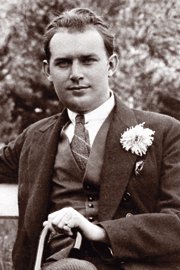 54
Jiří Wolker was a Czech poet, journalist and playwright. He was one of the founding members of KSČ - Communist Party of Czechoslovakia - in 1921.
54
Jiří Wolker was a Czech poet, journalist and playwright. He was one of the founding members of KSČ - Communist Party of Czechoslovakia - in 1921.
Ján Kollár
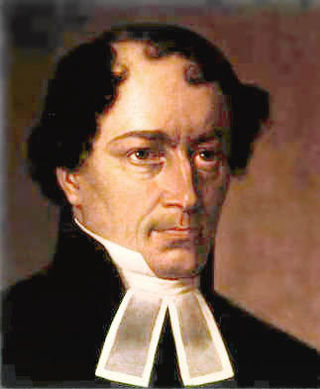 54
Ján Kollár was a Slovak writer, archaeologist, scientist, Lutheran pastor, politician, and main ideologist of Pan-Slavism.
54
Ján Kollár was a Slovak writer, archaeologist, scientist, Lutheran pastor, politician, and main ideologist of Pan-Slavism.
Lale Sokolov
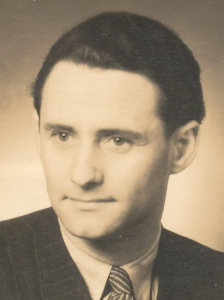 48
Ludwig Sokolov, was an Austro-Hungarian-born Slovak-Australian businessman and Holocaust survivor.
48
Ludwig Sokolov, was an Austro-Hungarian-born Slovak-Australian businessman and Holocaust survivor.
Mikoláš Aleš
 48
Mikoláš Aleš was a Czech painter. Aleš is estimated to have had over 5,000 published pictures; he painted for everything from magazines to playing cards to textbooks. His paintings were not...
48
Mikoláš Aleš was a Czech painter. Aleš is estimated to have had over 5,000 published pictures; he painted for everything from magazines to playing cards to textbooks. His paintings were not...
Prokop the Great
 46
Prokop the Great or Prokop the Bald or the Shaven was a Czech Hussite general and a prominent Taborite military leader during the Hussite Wars. On his mother's side, he came from a German patrician...
46
Prokop the Great or Prokop the Bald or the Shaven was a Czech Hussite general and a prominent Taborite military leader during the Hussite Wars. On his mother's side, he came from a German patrician...
Jan Šverma
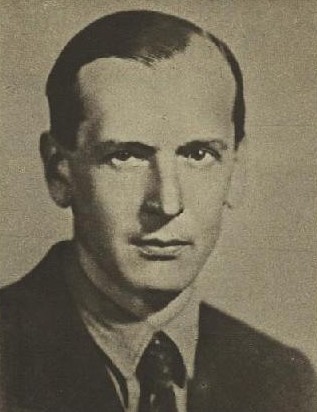 45
Jan Šverma was a Czech journalist, communist activist and resistance fighter against the Nazi-backed Slovak State. Šverma was considered a national hero in the Czechoslovak Socialist Republic.
45
Jan Šverma was a Czech journalist, communist activist and resistance fighter against the Nazi-backed Slovak State. Šverma was considered a national hero in the Czechoslovak Socialist Republic.
Edvard Beneš
 44
Edvard Beneš was a Czech politician and statesman who served as the president of Czechoslovakia from 1935 to 1938, and again from 1939 to 1948. During the first six years of his second stint, he led...
44
Edvard Beneš was a Czech politician and statesman who served as the president of Czechoslovakia from 1935 to 1938, and again from 1939 to 1948. During the first six years of his second stint, he led...
Zdeněk Fibich
 44
Zdeněk Fibich was a Czech composer of classical music. Among his compositions are chamber works, symphonic poems, three symphonies, at least seven operas, melodramas including the substantial trilogy...
44
Zdeněk Fibich was a Czech composer of classical music. Among his compositions are chamber works, symphonic poems, three symphonies, at least seven operas, melodramas including the substantial trilogy...
Vítězslav Hálek
 43
Vítězslav Hálek was a Czech poet, writer, journalist, dramatist and theatre critic.
43
Vítězslav Hálek was a Czech poet, writer, journalist, dramatist and theatre critic.
Jindřich Fügner
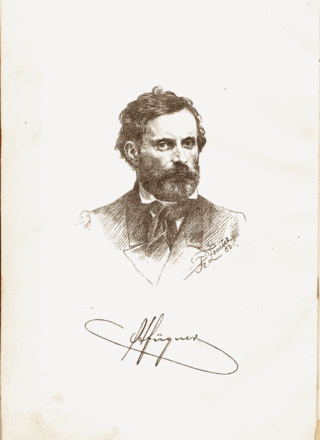 43
Jindřich Fügner was co-founder and the first starosta (leader) of the Czech sport organization Sokol.
43
Jindřich Fügner was co-founder and the first starosta (leader) of the Czech sport organization Sokol.
Jan Evangelista Purkyně
 41
Jan Evangelista Purkyně was a Czech anatomist and physiologist. In 1839, he coined the term "protoplasma" for the fluid substance of a cell. He was one of the best known scientists of his time. Such...
41
Jan Evangelista Purkyně was a Czech anatomist and physiologist. In 1839, he coined the term "protoplasma" for the fluid substance of a cell. He was one of the best known scientists of his time. Such...
Josef Dobrovský
 41
Josef Dobrovský was a Czech philologist and historian, one of the most important figures of the Czech National Revival along with Josef Jungmann.
41
Josef Dobrovský was a Czech philologist and historian, one of the most important figures of the Czech National Revival along with Josef Jungmann.
Leoš Janáček
 40
Leoš Janáček was a Czech composer, musical theorist, folklorist, publicist, and teacher. He was inspired by Moravian and other Slavic music, including Eastern European folk music, to create an...
40
Leoš Janáček was a Czech composer, musical theorist, folklorist, publicist, and teacher. He was inspired by Moravian and other Slavic music, including Eastern European folk music, to create an...
Petr Chelčický
 37
Petr Chelčický was a Czech Christian spiritual leader and author in the 15th century Bohemia, now the Czech Republic. He was one of the most influential thinkers of the Bohemian Reformation. Petr...
37
Petr Chelčický was a Czech Christian spiritual leader and author in the 15th century Bohemia, now the Czech Republic. He was one of the most influential thinkers of the Bohemian Reformation. Petr...
Stanislav Kostka Neumann
 36
Stanislav Kostka Neumann was Czech writer, poet, literary critic and journalist.
36
Stanislav Kostka Neumann was Czech writer, poet, literary critic and journalist.
Otakar Jaroš
 36
Otakar Jaroš was a Czech officer in the Czechoslovak forces in the Soviet Union. He was killed in the Battle of Sokolovo and became the first member of a foreign army decorated with the highest...
36
Otakar Jaroš was a Czech officer in the Czechoslovak forces in the Soviet Union. He was killed in the Battle of Sokolovo and became the first member of a foreign army decorated with the highest...
Milan Rastislav Štefánik
 35
Milan Rastislav Štefánik was a Slovak politician, diplomat, aviator and astronomer. During World War I, he served at the same time as a general in the French Army and as Minister of War for...
35
Milan Rastislav Štefánik was a Slovak politician, diplomat, aviator and astronomer. During World War I, he served at the same time as a general in the French Army and as Minister of War for...
František Ladislav Rieger
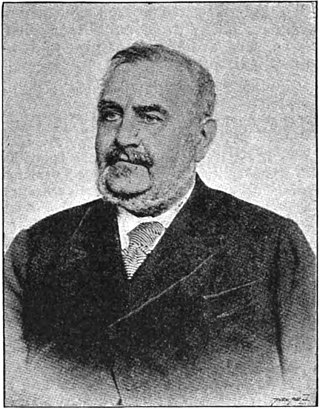 35
František Ladislav Rieger was a Czech politician and publicist made famous for his leadership of the early Czech nationalist movement.
35
František Ladislav Rieger was a Czech politician and publicist made famous for his leadership of the early Czech nationalist movement.
Karel Jaromír Erben
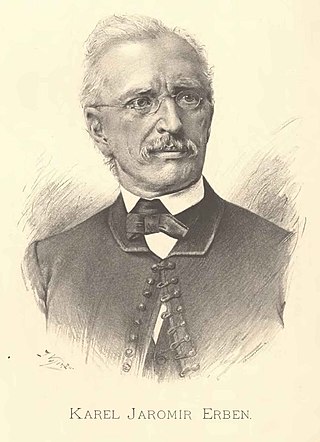 34
Karel Jaromír Erben was a Czech folklorist and poet of the mid-19th century, best known for his collection Kytice, which contains poems based on traditional and folkloric themes.
34
Karel Jaromír Erben was a Czech folklorist and poet of the mid-19th century, best known for his collection Kytice, which contains poems based on traditional and folkloric themes.
Josef Suk (composer)
 32
Josef Suk was a Czech composer and violinist. He studied under Antonín Dvořák, whose daughter he married.
32
Josef Suk was a Czech composer and violinist. He studied under Antonín Dvořák, whose daughter he married.
Karel Václav Rais
 31
Karel Václav Rais was a Czech realist novelist, author of the so-called country prose, numerous books for youth and children, and several poems.
31
Karel Václav Rais was a Czech realist novelist, author of the so-called country prose, numerous books for youth and children, and several poems.
Vladislav Vančura
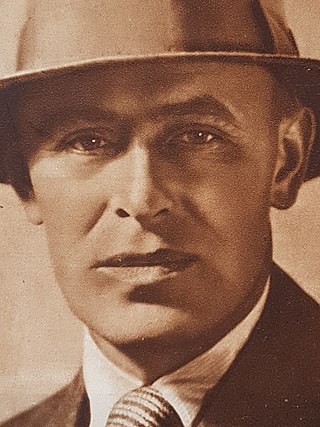 31
Vladislav Vančura was a Czech writer. He was also active as a film director, playwright and screenwriter. He was murdered by the Nazis.
31
Vladislav Vančura was a Czech writer. He was also active as a film director, playwright and screenwriter. He was murdered by the Nazis.
Jaroslav Seifert
 30
Jaroslav Seifert was a Czech writer, poet and journalist. Seifert was awarded the 1984 Nobel Prize in Literature "for his poetry which endowed with freshness, sensuality and rich inventiveness...
30
Jaroslav Seifert was a Czech writer, poet and journalist. Seifert was awarded the 1984 Nobel Prize in Literature "for his poetry which endowed with freshness, sensuality and rich inventiveness...
Julius Fučík (journalist)
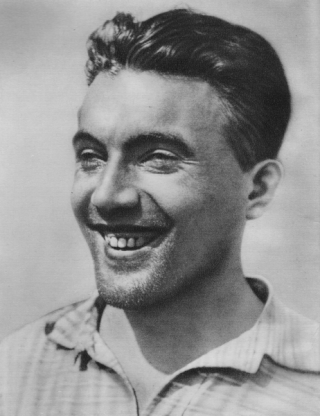 29
Julius Fučík was a Czech journalist, critic, writer, and active member of Communist Party of Czechoslovakia. For his part at the forefront of the anti-Nazi resistance during the Second World War, he...
29
Julius Fučík was a Czech journalist, critic, writer, and active member of Communist Party of Czechoslovakia. For his part at the forefront of the anti-Nazi resistance during the Second World War, he...
Vítězslav Nezval
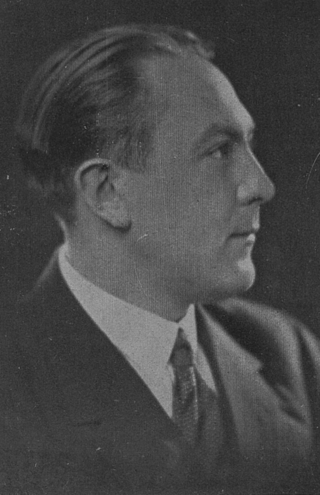 28
Vítězslav Nezval was a Czech poet, writer and translator. He was one of the most prolific avant-garde Czech writers in the first half of the 20th century and a co-founder of the Surrealist movement...
28
Vítězslav Nezval was a Czech poet, writer and translator. He was one of the most prolific avant-garde Czech writers in the first half of the 20th century and a co-founder of the Surrealist movement...
Otokar Březina
 27
Václav Jebavý ; mostly known by his pen name of Otokar or Otakar Březina ; was a Czech poet and essayist, considered the greatest of Czech Symbolists.
27
Václav Jebavý ; mostly known by his pen name of Otokar or Otakar Březina ; was a Czech poet and essayist, considered the greatest of Czech Symbolists.
Pavel Jozef Šafárik
 27
Pavel Jozef Šafárik was an ethnic Slovak philologist, poet, literary historian, historian and ethnographer in the Kingdom of Hungary. He was one of the first scientific Slavists.
27
Pavel Jozef Šafárik was an ethnic Slovak philologist, poet, literary historian, historian and ethnographer in the Kingdom of Hungary. He was one of the first scientific Slavists.
Jerome of Prague
Karolina Světlá
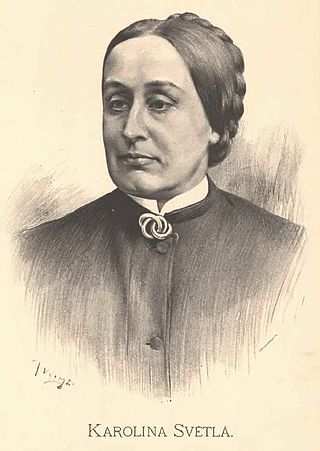 26
Karolina Světlá was a Czech female author of the 19th century. She was associated with the literary May School. She married Professor Petr Mužák (1821–1892) in 1852, who had taught her music. She...
26
Karolina Světlá was a Czech female author of the 19th century. She was associated with the literary May School. She married Professor Petr Mužák (1821–1892) in 1852, who had taught her music. She...
František Čelakovský
 26
František Ladislav Čelakovský was a Czech poet, translator, linguist, and literary critic. He was a major figure in the Czech "national revival". His most notable works are Ohlas písní ruských and...
26
František Ladislav Čelakovský was a Czech poet, translator, linguist, and literary critic. He was a major figure in the Czech "national revival". His most notable works are Ohlas písní ruských and...
František Křižík
 26
František Křižík was a Czech inventor, electrical engineer, and entrepreneur.
26
František Křižík was a Czech inventor, electrical engineer, and entrepreneur.
Ottokar II of Bohemia
 25
Ottokar II, the Iron and Golden King, was a member of the Přemyslid dynasty who reigned as King of Bohemia from 1253 until his death in 1278. He also held the titles of Margrave of Moravia from 1247,...
25
Ottokar II, the Iron and Golden King, was a member of the Přemyslid dynasty who reigned as King of Bohemia from 1253 until his death in 1278. He also held the titles of Margrave of Moravia from 1247,...
Franklin D. Roosevelt
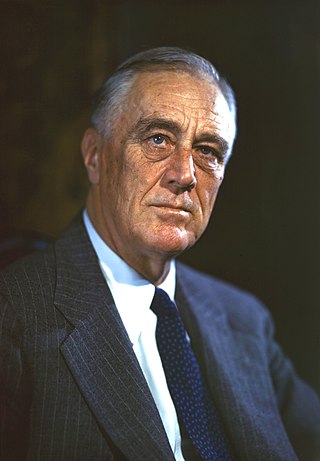 25
Franklin Delano Roosevelt, commonly known by his initials FDR, was an American statesman and politician who served as the 32nd president of the United States from 1933 until his death in 1945. He was...
25
Franklin Delano Roosevelt, commonly known by his initials FDR, was an American statesman and politician who served as the 32nd president of the United States from 1933 until his death in 1945. He was...
Jan Opletal
 24
Jan Opletal was a student of the Medical Faculty of the Charles University in Prague, who was shot at a Czechoslovak Independence Day rally on 28 October 1939. He was severely injured at this...
24
Jan Opletal was a student of the Medical Faculty of the Charles University in Prague, who was shot at a Czechoslovak Independence Day rally on 28 October 1939. He was severely injured at this...
Eliška Krásnohorská
 24
Eliška Krásnohorská was a Czech feminist author. She was introduced to literature and feminism by Karolína Světlá. She wrote works of lyric poetry and literary criticism, however, she is usually...
24
Eliška Krásnohorská was a Czech feminist author. She was introduced to literature and feminism by Karolína Světlá. She wrote works of lyric poetry and literary criticism, however, she is usually...
Jindřich Šimon Baar
 22
Jindřich Šimon Baar was a Czech Catholic priest and writer, realist, author of the so-called country prose. He joined the Czech Catholic modern style, but later severed the ties with that movement....
22
Jindřich Šimon Baar was a Czech Catholic priest and writer, realist, author of the so-called country prose. He joined the Czech Catholic modern style, but later severed the ties with that movement....
Josef Václav Sládek
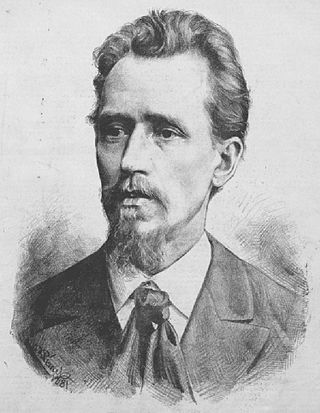 22
Josef Václav Sládek was a Czech poet, journalist and translator, member of the literary group Lumírovci, pioneer of children's poetry in Czech lands.
22
Josef Václav Sládek was a Czech poet, journalist and translator, member of the literary group Lumírovci, pioneer of children's poetry in Czech lands.
Wenceslaus I, Duke of Bohemia
 20
Wenceslaus I, Wenceslas I or Václav the Good was the Prince (kníže) of Bohemia from 921 until his death, probably in 935. According to the legend, he was assassinated by his younger brother,...
20
Wenceslaus I, Wenceslas I or Václav the Good was the Prince (kníže) of Bohemia from 921 until his death, probably in 935. According to the legend, he was assassinated by his younger brother,...
Jan Sladký Kozina
 20
Jan Sladký Kozina was the Czech revolutionary leader of the Chodové peasant rebellion at the end of the 17th century.
20
Jan Sladký Kozina was the Czech revolutionary leader of the Chodové peasant rebellion at the end of the 17th century.
Karel Klostermann
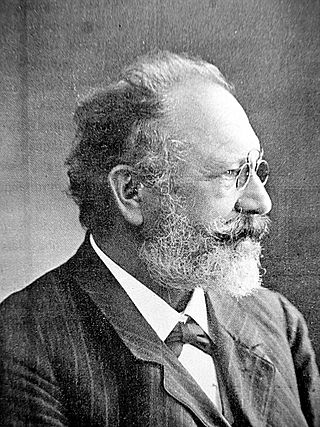 20
Karel Klostermann was a Czech-German writer. He wrote under the alias Faustin.
20
Karel Klostermann was a Czech-German writer. He wrote under the alias Faustin.
Josef Lada
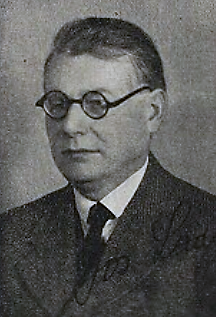 19
Josef Lada was a Czech painter, illustrator and writer. He is best known as the illustrator of Jaroslav Hašek's World War I novel The Good Soldier Švejk, having won the Deutscher Jugendliteraturpreis...
19
Josef Lada was a Czech painter, illustrator and writer. He is best known as the illustrator of Jaroslav Hašek's World War I novel The Good Soldier Švejk, having won the Deutscher Jugendliteraturpreis...
Maxim Gorky
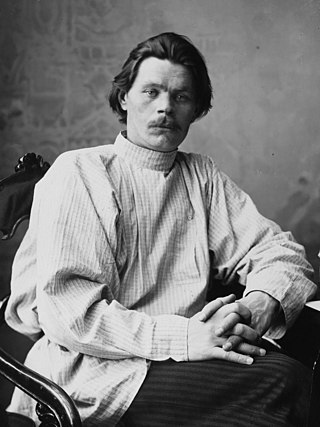 19
Alexei Maximovich Peshkov, popularly known as Maxim Gorky, was a Russian and Soviet writer and socialism proponent. He was nominated five times for the Nobel Prize in Literature. Before his success...
19
Alexei Maximovich Peshkov, popularly known as Maxim Gorky, was a Russian and Soviet writer and socialism proponent. He was nominated five times for the Nobel Prize in Literature. Before his success...
Ivan Olbracht
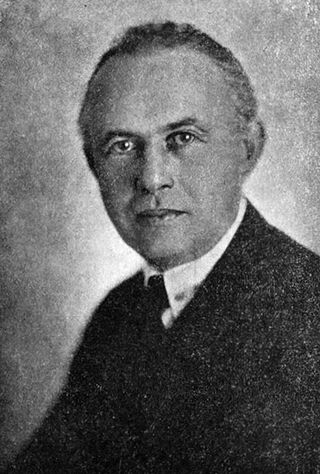 18
Ivan Olbracht, born Kamil Zeman was a Czech censor, writer, journalist and translator of German prose.
18
Ivan Olbracht, born Kamil Zeman was a Czech censor, writer, journalist and translator of German prose.
František Škroup
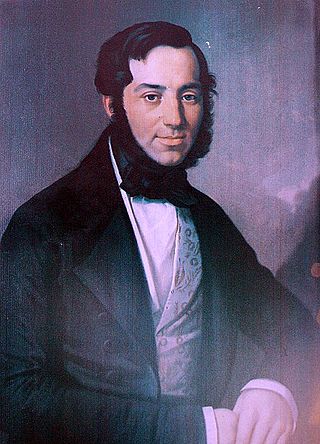 18
František Jan Škroup was a Czech composer and conductor. His brother Jan Nepomuk Škroup was also a successful composer and his father, Dominik Škroup, and other brother Ignác Škroup were lesser known...
18
František Jan Škroup was a Czech composer and conductor. His brother Jan Nepomuk Škroup was also a successful composer and his father, Dominik Škroup, and other brother Ignác Škroup were lesser known...
Josef Hybeš
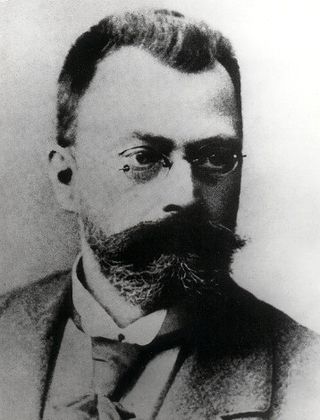 18
Josef Hybeš byl rakouský, český a československý sociálně demokratický politik a novinář. Již v mládí organizoval v oblasti Vídně a na jižní Moravě dělnické hnutí a stávky textilních dělníků. Za...
18
Josef Hybeš byl rakouský, český a československý sociálně demokratický politik a novinář. Již v mládí organizoval v oblasti Vídně a na jižní Moravě dělnické hnutí a stávky textilních dělníků. Za...
Fráňa Šrámek
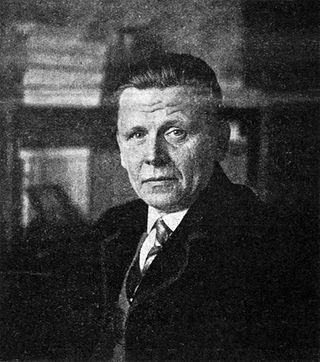 17
Fráňa Šrámek was a Czech impressionist and vitalist poet, novelist, playwright and anarchist.
17
Fráňa Šrámek was a Czech impressionist and vitalist poet, novelist, playwright and anarchist.
Václav Brožík
 17
Václav Brožík was a Czech painter who worked in the academic style.
17
Václav Brožík was a Czech painter who worked in the academic style.
Jan Želivský
 16
Jan Želivský was a prominent Czech priest during the Hussite Reformation.
16
Jan Želivský was a prominent Czech priest during the Hussite Reformation.
Ján Nálepka
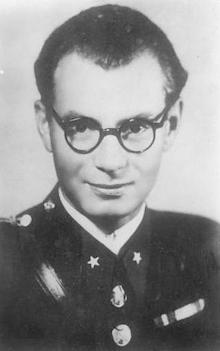 15
Ján Nálepka was a Slovak captain who organized and led an anti-fascist Slovak partisan detachment in the Soviet Union during World War II.
15
Ján Nálepka was a Slovak captain who organized and led an anti-fascist Slovak partisan detachment in the Soviet Union during World War II.
Karel Sladkovský
 14
Karel Sladkovský byl český novinář a politik, během revolučního roku 1848 představitel radikálních českých demokratů. Pozdějí byl vězněn, po roce 1860 opět aktivní politik, poslanec Českého zemského...
14
Karel Sladkovský byl český novinář a politik, během revolučního roku 1848 představitel radikálních českých demokratů. Pozdějí byl vězněn, po roce 1860 opět aktivní politik, poslanec Českého zemského...
Brothers Čapek
 14
The Brothers Čapek were Josef and Karel Čapek, Czech writers who sometimes wrote together. They are commemorated both for their literary/artistic works and political activism against oppressive...
14
The Brothers Čapek were Josef and Karel Čapek, Czech writers who sometimes wrote together. They are commemorated both for their literary/artistic works and political activism against oppressive...
Josef Václav Myslbek
 14
Josef Václav Myslbek was a Czech sculptor and medalist credited with founding the modern Czech sculpting style.
14
Josef Václav Myslbek was a Czech sculptor and medalist credited with founding the modern Czech sculpting style.
Yuri Gagarin
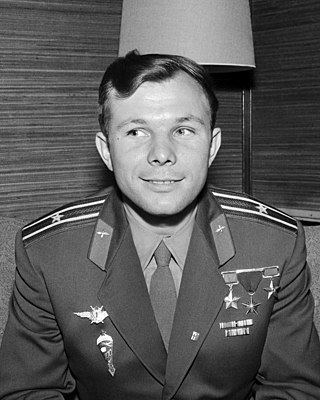 14
Yuri Alekseyevich Gagarin was a Soviet pilot and cosmonaut who, aboard the first successful crewed spaceflight, became the first human to journey into outer space. Travelling on Vostok 1, Gagarin...
14
Yuri Alekseyevich Gagarin was a Soviet pilot and cosmonaut who, aboard the first successful crewed spaceflight, became the first human to journey into outer space. Travelling on Vostok 1, Gagarin...
Milada Horáková
 14
Milada Horáková was a Czech politician and a member of the underground resistance movement during World War II. She was a victim of judicial murder, convicted and executed by the Communist Party of...
14
Milada Horáková was a Czech politician and a member of the underground resistance movement during World War II. She was a victim of judicial murder, convicted and executed by the Communist Party of...
Julius Zeyer
 13
Julius Zeyer was a Czech prose writer, poet, and playwright.
13
Julius Zeyer was a Czech prose writer, poet, and playwright.
Charles IV, Holy Roman Emperor
 13
Charles IV, also known as Charles of Luxembourg, born Wenceslaus, was Holy Roman Emperor from 1355 until his death in 1378. He was elected King of Germany in 1346 and became King of Bohemia that same...
13
Charles IV, also known as Charles of Luxembourg, born Wenceslaus, was Holy Roman Emperor from 1355 until his death in 1378. He was elected King of Germany in 1346 and became King of Bohemia that same...
Jan Palach
Marie Majerová
 13
Marie Majerová was a Czech writer and translator.
13
Marie Majerová was a Czech writer and translator.
Eduard Vojan
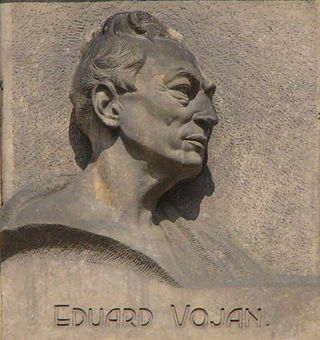 12
Eduard Vojan was a Czech actor of early cinema.
12
Eduard Vojan was a Czech actor of early cinema.
Max Švabinský
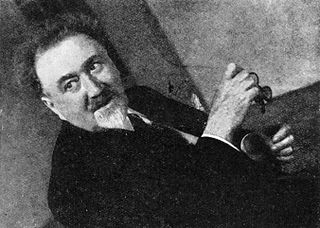 12
Max Švabinský was a Czech painter, draughtsman, graphic artist, and professor in Academy of Graphic Arts in Prague. Švabinský is considered one of the more notable artists in the history of Czech...
12
Max Švabinský was a Czech painter, draughtsman, graphic artist, and professor in Academy of Graphic Arts in Prague. Švabinský is considered one of the more notable artists in the history of Czech...
Alexander Pushkin
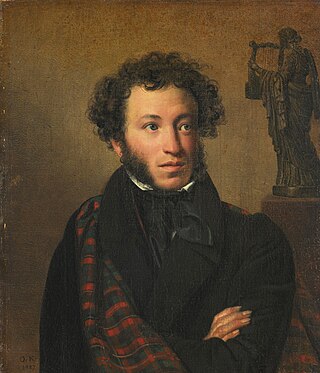 12
Alexander Sergeyevich Pushkin was a Russian poet, playwright, and novelist of the Romantic era. He is considered by many to be the greatest Russian poet, as well as the founder of modern Russian...
12
Alexander Sergeyevich Pushkin was a Russian poet, playwright, and novelist of the Romantic era. He is considered by many to be the greatest Russian poet, as well as the founder of modern Russian...
Václav Kliment Klicpera
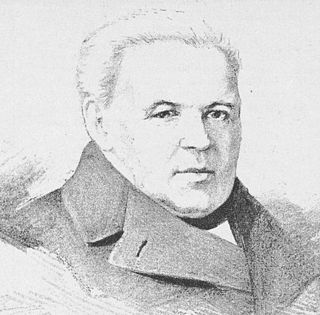 12
Václav Kliment Klicpera was a Czech playwright, writer, and poet. He was one of the first presenters of Czech drama, and was especially influential in the foundation of comedic Czech theatre.
12
Václav Kliment Klicpera was a Czech playwright, writer, and poet. He was one of the first presenters of Czech drama, and was especially influential in the foundation of comedic Czech theatre.
Peter Jilemnický
 12
Peter Jilemnický was a Slovak writer, journalist, educator and Communist politician of Czech origin.
12
Peter Jilemnický was a Slovak writer, journalist, educator and Communist politician of Czech origin.
Jan Blahoslav
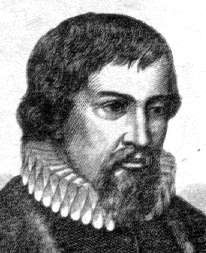 12
Jan Blahoslav was a Czech humanistic writer, poet, translator, etymologist, hymnographer, grammarian, music theorist and composer. He was a Unity of the Brethren bishop, and translated the New...
12
Jan Blahoslav was a Czech humanistic writer, poet, translator, etymologist, hymnographer, grammarian, music theorist and composer. He was a Unity of the Brethren bishop, and translated the New...
Bohuslav Martinů
 11
Bohuslav Jan Martinů was a Czech composer of modern classical music. He wrote 6 symphonies, 15 operas, 14 ballet scores and a large body of orchestral, chamber, vocal and instrumental works. He...
11
Bohuslav Jan Martinů was a Czech composer of modern classical music. He wrote 6 symphonies, 15 operas, 14 ballet scores and a large body of orchestral, chamber, vocal and instrumental works. He...
Wolfgang Amadeus Mozart
 10
Wolfgang Amadeus Mozart was a prolific and influential composer of the Classical period. Despite his short life, his rapid pace of composition resulted in more than 800 works representing virtually...
10
Wolfgang Amadeus Mozart was a prolific and influential composer of the Classical period. Despite his short life, his rapid pace of composition resulted in more than 800 works representing virtually...
Alphonse Mucha
 10
Alfons Maria Mucha, known internationally as Alphonse Mucha, was a Czech painter, illustrator, and graphic artist. Living in Paris during the Art Nouveau period, he was widely known for his...
10
Alfons Maria Mucha, known internationally as Alphonse Mucha, was a Czech painter, illustrator, and graphic artist. Living in Paris during the Art Nouveau period, he was widely known for his...
Petr Brandl
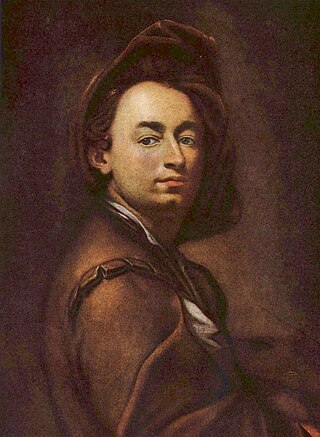 10
Petr Brandl was a Czech painter of the late Baroque in the bilingual Kingdom of Bohemia. Brandl was the sixth child in a Czech-German family. His father, Michal Brandl, worked as a tailor and was of...
10
Petr Brandl was a Czech painter of the late Baroque in the bilingual Kingdom of Bohemia. Brandl was the sixth child in a Czech-German family. His father, Michal Brandl, worked as a tailor and was of...
Josef Hora
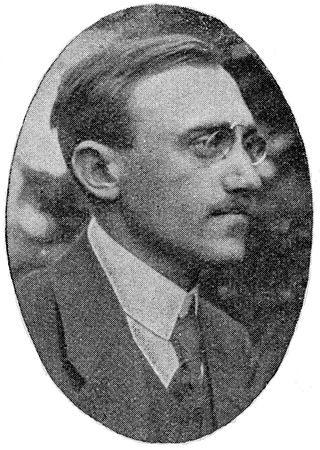 10
Josef Hora was a Czechoslovak poet, literary critic and journalist.
10
Josef Hora was a Czechoslovak poet, literary critic and journalist.
Antonín Benjamin Svojsík
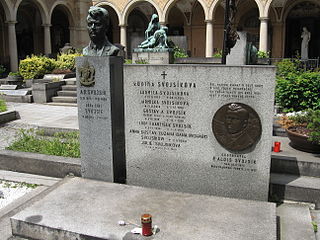 9
Antonín Benjamin Svojsík was a Czech pedagogue. He was the founder of the Czechoslovak Scouting organization Junák.
9
Antonín Benjamin Svojsík was a Czech pedagogue. He was the founder of the Czechoslovak Scouting organization Junák.
Matěj Kopecký
 9
Matěj Kopecký was a Czech puppeteer. For six generations his descendants followed the art of puppeteering.
9
Matěj Kopecký was a Czech puppeteer. For six generations his descendants followed the art of puppeteering.
Josef Thomayer
 8
Josef Thomayer byl český lékař – profesor vnitřního lékařství, jeden ze zakladatelů české lékařské vědy. Velkou měrou se zasloužil o zlepšení podmínek na českých klinikách. Jde o tvůrce českého...
8
Josef Thomayer byl český lékař – profesor vnitřního lékařství, jeden ze zakladatelů české lékařské vědy. Velkou měrou se zasloužil o zlepšení podmínek na českých klinikách. Jde o tvůrce českého...
Johann Wolfgang von Goethe
 8
Johann Wolfgang von Goethe was a German polymath and writer, who is widely regarded as the greatest and most influential writer in the German language. His work has had a profound and wide-ranging...
8
Johann Wolfgang von Goethe was a German polymath and writer, who is widely regarded as the greatest and most influential writer in the German language. His work has had a profound and wide-ranging...
Pavel Křížkovský
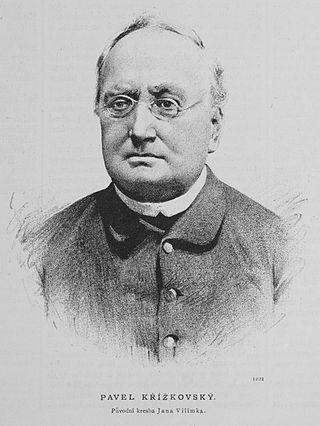 8
Pavel Křížkovský was a Czech choral composer and conductor.
8
Pavel Křížkovský was a Czech choral composer and conductor.
Prokop Diviš
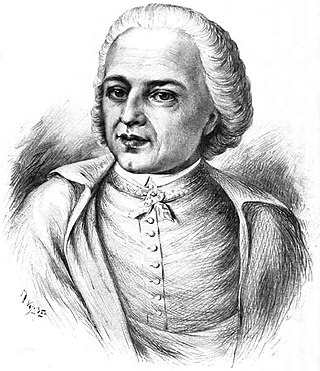 8
Prokop Diviš O.Praem. was a Czech canon regular, theologian and natural scientist. In an attempt to prevent thunderstorms from occurring, he inadvertently constructed one of the first grounded...
8
Prokop Diviš O.Praem. was a Czech canon regular, theologian and natural scientist. In an attempt to prevent thunderstorms from occurring, he inadvertently constructed one of the first grounded...
Bolesław I the Brave
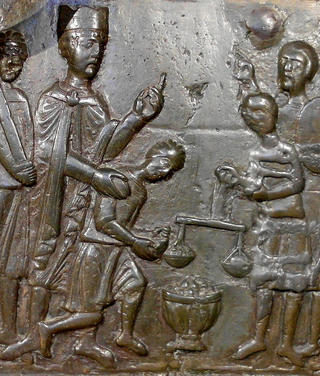 8
Bolesław I the Brave, less often known as Bolesław the Great, was Duke of Poland from 992 to 1025, and the first King of Poland in 1025. He was also Duke of Bohemia between 1003 and 1004 as Boleslaus...
8
Bolesław I the Brave, less often known as Bolesław the Great, was Duke of Poland from 992 to 1025, and the first King of Poland in 1025. He was also Duke of Bohemia between 1003 and 1004 as Boleslaus...
Franz Kafka
 7
Franz Kafka was a German-speaking Bohemian Jewish novelist and writer from Prague. He is widely regarded as one of the major figures of 20th-century literature. His work fuses elements of realism and...
7
Franz Kafka was a German-speaking Bohemian Jewish novelist and writer from Prague. He is widely regarded as one of the major figures of 20th-century literature. His work fuses elements of realism and...
Pavol Országh Hviezdoslav
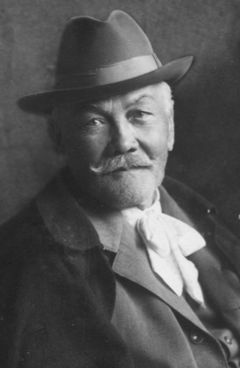 7
Pavol Országh Hviezdoslav was a Slovak poet, dramatist, translator, and for a short time, member of the Czechoslovak parliament. Originally, he wrote in a traditional style, but later became...
7
Pavol Országh Hviezdoslav was a Slovak poet, dramatist, translator, and for a short time, member of the Czechoslovak parliament. Originally, he wrote in a traditional style, but later became...
Bohumír Šmeral
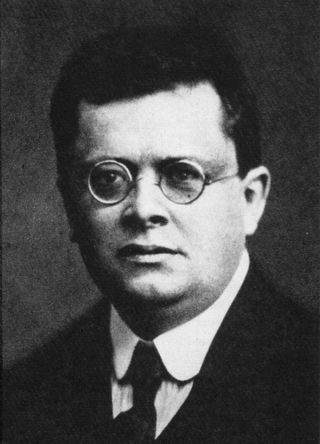 7
Bohumír Šmeral was a Czech politician, leader of the Czech Social Democratic Party, and one of the founders of the Communist Party of Czechoslovakia.
7
Bohumír Šmeral was a Czech politician, leader of the Czech Social Democratic Party, and one of the founders of the Communist Party of Czechoslovakia.
Jaroslav Ježek (composer)
 7
Jaroslav Ježek was a Czech composer, pianist and conductor, author of jazz, classical, incidental and film music.
7
Jaroslav Ježek was a Czech composer, pianist and conductor, author of jazz, classical, incidental and film music.
Otakar Ševčík
 7
Otakar Ševčík was a Czech violinist and influential teacher. He was known as a soloist and an ensemble player, including his occasional performances with Eugène Ysaÿe.
7
Otakar Ševčík was a Czech violinist and influential teacher. He was known as a soloist and an ensemble player, including his occasional performances with Eugène Ysaÿe.
Vít Nejedlý
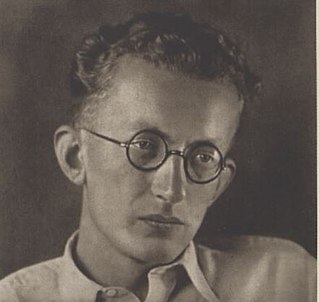 7
Vít Nejedlý byl český hudební skladatel, dirigent, publicista, redaktor a muzikolog, syn hudebního vědce a politika Zdeňka Nejedlého.
7
Vít Nejedlý byl český hudební skladatel, dirigent, publicista, redaktor a muzikolog, syn hudebního vědce a politika Zdeňka Nejedlého.
Jaroslav Heyrovský
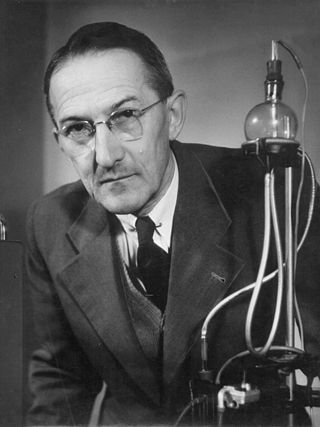 7
Jaroslav Heyrovský was a Czech chemist and inventor. Heyrovský was the inventor of the polarographic method, father of the electroanalytical method, and recipient of the Nobel Prize in 1959 for his...
7
Jaroslav Heyrovský was a Czech chemist and inventor. Heyrovský was the inventor of the polarographic method, father of the electroanalytical method, and recipient of the Nobel Prize in 1959 for his...
Bořivoj I, Duke of Bohemia
 6
Bořivoj I was the first historically documented Duke of Bohemia and progenitor of the Přemyslid dynasty. His reign over the Duchy of Bohemia is believed to have started about the year 870, but in...
6
Bořivoj I was the first historically documented Duke of Bohemia and progenitor of the Přemyslid dynasty. His reign over the Duchy of Bohemia is believed to have started about the year 870, but in...
Carl Borivoj Presl
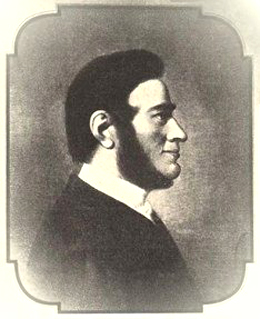 6
Carl Borivoj Presl was a Czech botanist.
6
Carl Borivoj Presl was a Czech botanist.
Přemyslid dynasty
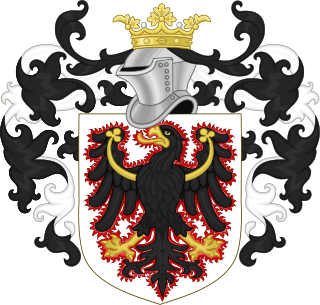 6
The Přemyslid dynasty or House of Přemysl was a Bohemian royal dynasty that reigned in the Duchy of Bohemia and later Kingdom of Bohemia and Margraviate of Moravia, as well as in parts of Poland,...
6
The Přemyslid dynasty or House of Přemysl was a Bohemian royal dynasty that reigned in the Duchy of Bohemia and later Kingdom of Bohemia and Margraviate of Moravia, as well as in parts of Poland,...
Ladislav Stroupežnický
 6
Ladislav Stroupežnický was a Czech author, playwright, and dramatist, best known for the frequently staged play Naši furianti.
6
Ladislav Stroupežnický was a Czech author, playwright, and dramatist, best known for the frequently staged play Naši furianti.
Karl Burian (Offizier)
 6
Karl Burian war ein österreichischer Offizier. Als legitimistischer Widerstandskämpfer verlor er sein Leben im Kampf gegen den Nationalsozialismus.
6
Karl Burian war ein österreichischer Offizier. Als legitimistischer Widerstandskämpfer verlor er sein Leben im Kampf gegen den Nationalsozialismus.
Jan Roháč of Dubá
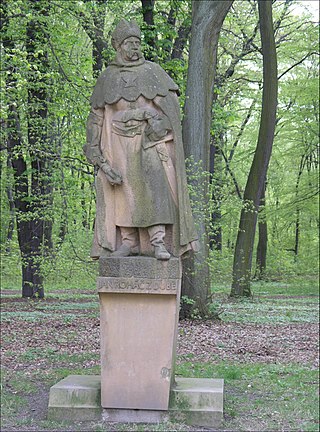 6
Jan Roháč of Dubá was a Bohemian Hussite general who originated in the Bohemian gentry.
6
Jan Roháč of Dubá was a Bohemian Hussite general who originated in the Bohemian gentry.
Neklan
 6
Neklan was the sixth of the seven Bohemian mythical princes between the founder of the Přemyslid dynasty Přemysl the Ploughman and the first historical prince Bořivoj. The names of the princes were...
6
Neklan was the sixth of the seven Bohemian mythical princes between the founder of the Přemyslid dynasty Přemysl the Ploughman and the first historical prince Bořivoj. The names of the princes were...
Jan Valerián Jirsík
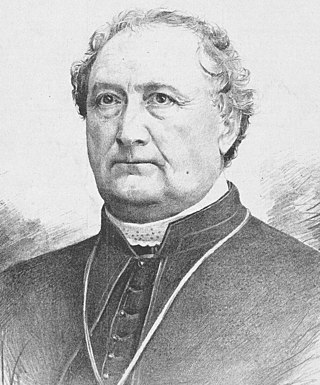 6
Jan Valerián Jirsík was a Roman Catholic clergyman, who was appointed the fourth Bishop of České Budějovice in 1851.
6
Jan Valerián Jirsík was a Roman Catholic clergyman, who was appointed the fourth Bishop of České Budějovice in 1851.
Adam Mickiewicz
 6
Adam Bernard Mickiewicz was a Polish poet, dramatist, essayist, publicist, translator and political activist. He is regarded as national poet in Poland, Lithuania and Belarus. He also largely...
6
Adam Bernard Mickiewicz was a Polish poet, dramatist, essayist, publicist, translator and political activist. He is regarded as national poet in Poland, Lithuania and Belarus. He also largely...
George Voskovec
 5
Jiří Voskovec, born Jiří Wachsmann and known in the United States as George Voskovec was a Czech-American actor. Throughout much of his career, he was associated with actor and playwright Jan Werich....
5
Jiří Voskovec, born Jiří Wachsmann and known in the United States as George Voskovec was a Czech-American actor. Throughout much of his career, he was associated with actor and playwright Jan Werich....
Emmy Destinn
 5
Emmy Destinn was a Czech operatic dramatic soprano. She had a career both in Europe and at the New York Metropolitan Opera. She was one of the greatest opera singers of the 19th and 20th centuries.
5
Emmy Destinn was a Czech operatic dramatic soprano. She had a career both in Europe and at the New York Metropolitan Opera. She was one of the greatest opera singers of the 19th and 20th centuries.
Arthur Adamov
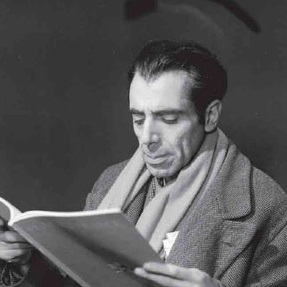 5
Arthur Adamov was a playwright, one of the foremost exponents of the Theatre of the Absurd.
5
Arthur Adamov was a playwright, one of the foremost exponents of the Theatre of the Absurd.
František Hrubín
 5
František Hrubín was a Czech poet and writer.
5
František Hrubín was a Czech poet and writer.
Antonín Jaroslav Puchmajer
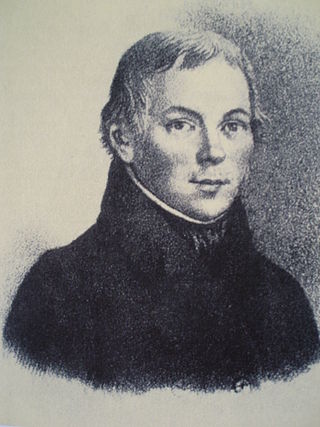 5
Antonín Jaroslav Puchmajer byl český spisovatel, básník, překladatel, vlastenecký kněz a první český romista.
5
Antonín Jaroslav Puchmajer byl český spisovatel, básník, překladatel, vlastenecký kněz a první český romista.
Alois Eliáš
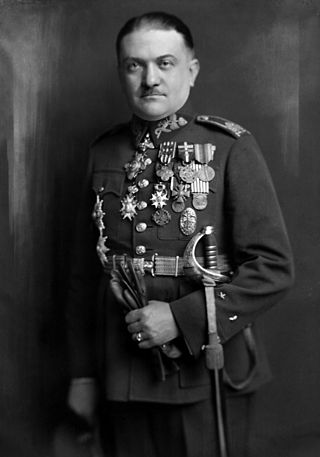 5
Alois Eliáš was a Czech general and politician. He served as prime minister of the puppet government of the German-occupied Protectorate of Bohemia and Moravia from 27 April 1939 to 27 September 1941...
5
Alois Eliáš was a Czech general and politician. He served as prime minister of the puppet government of the German-occupied Protectorate of Bohemia and Moravia from 27 April 1939 to 27 September 1941...
Jan Zajíc
 4
Jan Zajíc was a Czech student who killed himself by self-immolation as a political protest.
4
Jan Zajíc was a Czech student who killed himself by self-immolation as a political protest.
Louis Pasteur
 4
Louis Pasteur was a French chemist, pharmacist, and microbiologist renowned for his discoveries of the principles of vaccination, microbial fermentation, and pasteurization, the last of which was...
4
Louis Pasteur was a French chemist, pharmacist, and microbiologist renowned for his discoveries of the principles of vaccination, microbial fermentation, and pasteurization, the last of which was...
Ludwig van Beethoven
 4
Ludwig van Beethoven was a German composer and pianist. He is one of the most revered figures in the history of Western music; his works rank among the most performed of the classical music...
4
Ludwig van Beethoven was a German composer and pianist. He is one of the most revered figures in the history of Western music; his works rank among the most performed of the classical music...
Heliodor Píka
 4
General Heliodor Píka was a Czechoslovak army officer who was the first Victim of judicial murder of the Czechoslovak Communist show trials.
4
General Heliodor Píka was a Czechoslovak army officer who was the first Victim of judicial murder of the Czechoslovak Communist show trials.
Antal Stašek
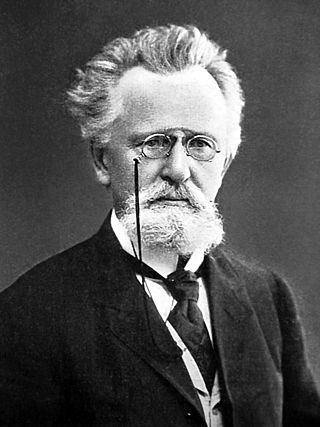 4
Antal Stašek was a Czech writer and lawyer.
4
Antal Stašek was a Czech writer and lawyer.
Karl Marx
 4
Karl Marx was a German-born philosopher, economist, political theorist, historian, sociologist, journalist, and revolutionary socialist. His best-known works are the 1848 pamphlet The Communist...
4
Karl Marx was a German-born philosopher, economist, political theorist, historian, sociologist, journalist, and revolutionary socialist. His best-known works are the 1848 pamphlet The Communist...
Jan Masaryk
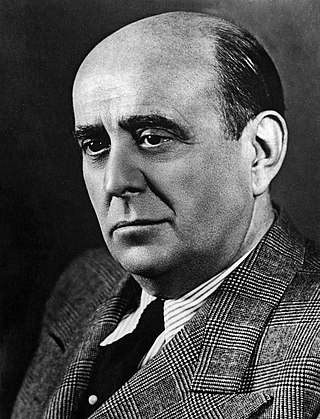 4
Jan Garrigue Masaryk was a Czech diplomat and politician who served as the Foreign Minister of Czechoslovakia from 1940 to 1948. American journalist John Gunther described Masaryk as "a brave,...
4
Jan Garrigue Masaryk was a Czech diplomat and politician who served as the Foreign Minister of Czechoslovakia from 1940 to 1948. American journalist John Gunther described Masaryk as "a brave,...
Jára Cimrman
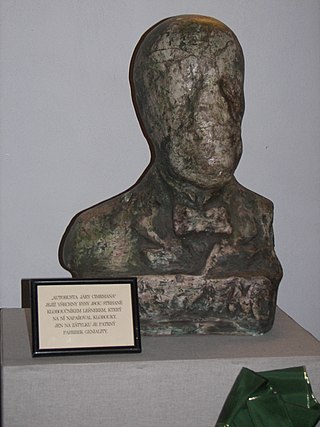 4
Jára Cimrman or Jára da Cimrman, also known as "the Master", is a fictional Czech polymath, created by Ladislav Smoljak, Jiří Šebánek and Zdeněk Svěrák. The fictional personality is presented as a...
4
Jára Cimrman or Jára da Cimrman, also known as "the Master", is a fictional Czech polymath, created by Ladislav Smoljak, Jiří Šebánek and Zdeněk Svěrák. The fictional personality is presented as a...
Zdeněk Nejedlý
 4
Zdeněk Nejedlý was a Czech musicologist, historian, music critic, author, and politician whose ideas dominated the cultural life of what is now the Czech Republic for most of the twentieth century....
4
Zdeněk Nejedlý was a Czech musicologist, historian, music critic, author, and politician whose ideas dominated the cultural life of what is now the Czech Republic for most of the twentieth century....
František Sokol-Tůma
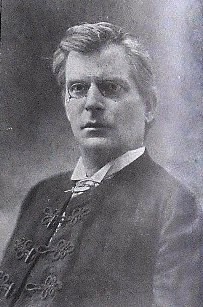 3
František Sokol-Tůma, byl český spisovatel, novinář a dramatik.
3
František Sokol-Tůma, byl český spisovatel, novinář a dramatik.
Jindřich Plachta
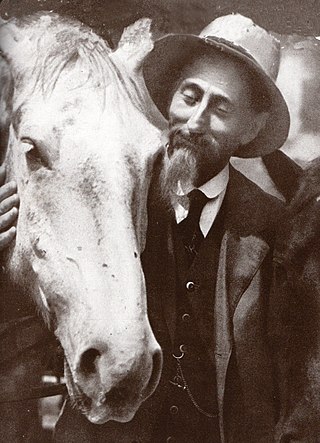 3
Jindřich Plachta, born Jindřich Šolle was a Czechoslovak film actor. He appeared in more than 100 films between 1926 and 1951.
3
Jindřich Plachta, born Jindřich Šolle was a Czechoslovak film actor. He appeared in more than 100 films between 1926 and 1951.
Bartholomew the Apostle
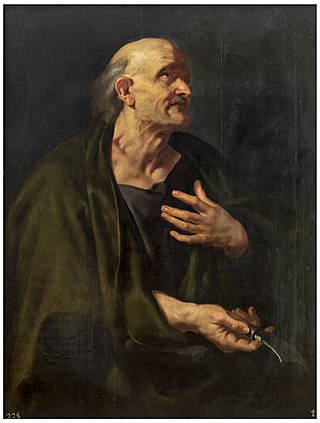 3
Bartholomew was one of the twelve apostles of Jesus according to the New Testament. Most scholars today identify Bartholomew as Nathanael or Nathaniel, who appears in the Gospel of John.
3
Bartholomew was one of the twelve apostles of Jesus according to the New Testament. Most scholars today identify Bartholomew as Nathanael or Nathaniel, who appears in the Gospel of John.
Marie Kudeříková
 3
Marie Kudeříková was a student active in the Czech resistance to Nazi occupation during World War II. In 1941 she was arrested by Gestapo and at a subsequent trial she was sentenced to death. She was...
3
Marie Kudeříková was a student active in the Czech resistance to Nazi occupation during World War II. In 1941 she was arrested by Gestapo and at a subsequent trial she was sentenced to death. She was...
Artuš Scheiner
 3
Artuš or Artur Scheiner was a prolific Bohemian painter, decorative artist, and illustrator, known best for his precise gouache drawing, mostly in secessional style. He produced many paintings,...
3
Artuš or Artur Scheiner was a prolific Bohemian painter, decorative artist, and illustrator, known best for his precise gouache drawing, mostly in secessional style. He produced many paintings,...
Alexander Suvorov
 3
Count Alexander Vasilyevich Suvorov-Rymniksky, Prince of Italy, was a Russian general and military theorist in the service of the Russian Empire.
3
Count Alexander Vasilyevich Suvorov-Rymniksky, Prince of Italy, was a Russian general and military theorist in the service of the Russian Empire.
Rudolf II, Holy Roman Emperor
 3
Rudolf II was Holy Roman Emperor (1576–1612), King of Hungary and Croatia, King of Bohemia (1575–1608/1611) and Archduke of Austria (1576–1608). He was a member of the House of Habsburg.
3
Rudolf II was Holy Roman Emperor (1576–1612), King of Hungary and Croatia, King of Bohemia (1575–1608/1611) and Archduke of Austria (1576–1608). He was a member of the House of Habsburg.
Elizabeth of Bohemia (1292–1330)
 3
Elizabeth of Bohemia was a princess of the Bohemian Přemyslid dynasty who became Queen of Bohemia as the first wife of King John the Blind. She was the mother of Emperor Charles IV, King of Bohemia,...
3
Elizabeth of Bohemia was a princess of the Bohemian Přemyslid dynasty who became Queen of Bohemia as the first wife of King John the Blind. She was the mother of Emperor Charles IV, King of Bohemia,...
Frédéric Chopin
 3
Frédéric François Chopin was a Polish composer and virtuoso pianist of the Romantic period, who wrote primarily for solo piano. He has maintained worldwide renown as a leading musician of his era,...
3
Frédéric François Chopin was a Polish composer and virtuoso pianist of the Romantic period, who wrote primarily for solo piano. He has maintained worldwide renown as a leading musician of his era,...
Jaroslav Stránský
 3
Jaroslav Stránský byl český a československý prvorepublikový i poválečný politik, novinář a právník. Za druhé světové války i po roce 1948 působil v československém exilu.
3
Jaroslav Stránský byl český a československý prvorepublikový i poválečný politik, novinář a právník. Za druhé světové války i po roce 1948 působil v československém exilu.
Ivan Pavlov
 3
Ivan Petrovich Pavlov was a Russian and Soviet experimental neurologist and physiologist known for his discovery of classical conditioning through his experiments with dogs.
3
Ivan Petrovich Pavlov was a Russian and Soviet experimental neurologist and physiologist known for his discovery of classical conditioning through his experiments with dogs.
Fyodor Dostoevsky
 3
Fyodor Mikhailovich Dostoevsky, sometimes transliterated as Dostoyevsky, was a Russian novelist, short story writer, essayist and journalist. Numerous literary critics regard him as one of the...
3
Fyodor Mikhailovich Dostoevsky, sometimes transliterated as Dostoyevsky, was a Russian novelist, short story writer, essayist and journalist. Numerous literary critics regard him as one of the...
August Bebel
 3
Ferdinand August Bebel was a German socialist politician, writer, and orator. He is best remembered as one of the founders of the Social Democratic Workers' Party of Germany (SDAP) in 1869, which in...
3
Ferdinand August Bebel was a German socialist politician, writer, and orator. He is best remembered as one of the founders of the Social Democratic Workers' Party of Germany (SDAP) in 1869, which in...
Heinrich Heine
 3
Christian Johann Heinrich Heine was a German poet, writer and literary critic. He is best known outside Germany for his early lyric poetry, which was set to music in the form of Lieder by composers...
3
Christian Johann Heinrich Heine was a German poet, writer and literary critic. He is best known outside Germany for his early lyric poetry, which was set to music in the form of Lieder by composers...